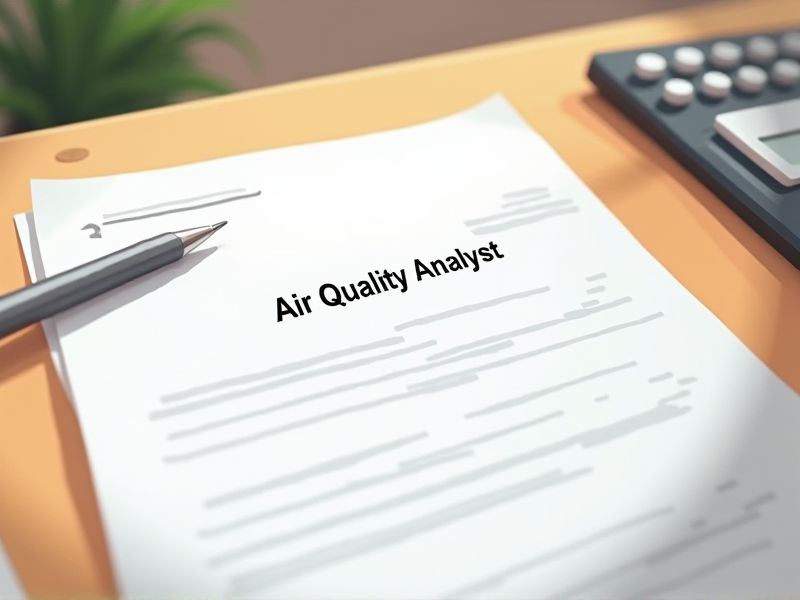
Air Quality Analysts play a crucial role in monitoring and improving the air we breathe, necessitating a deep understanding of environmental science and regulations. Certifications ensure these professionals are equipped with the latest knowledge and skills to effectively assess and manage air quality issues. These credentials validate their expertise in using monitoring equipment and analyzing data to comply with governmental standards. Key certifications essential for an Air Quality Analyst include the following.
Certified Air Quality Specialist (CAQS)
The need for a Certified Air Quality Specialist (CAQS) arises because air quality analysts require specialized knowledge to accurately assess and interpret complex environmental data. Poor air quality can significantly affect public health and ecosystem stability, necessitating expertise to mitigate these risks effectively. Regulations governing air pollution are becoming more stringent, thus qualified professionals like a CAQS ensure compliance with these laws. A CAQS brings credibility and expert insights, essential for developing effective air quality management strategies.
Certified Indoor Air Quality Professional (CIAQP)
A Certified Indoor Air Quality Professional (CIAQP) is essential for an Air Quality Analyst because they possess specialized knowledge to assess and interpret complex air quality data accurately. When buildings have poor indoor air quality, inhabitants often report health issues, underscoring the need for a qualified professional to identify and remedy pollutants. Employers and building owners increasingly demand CIAQP credentials to ensure legal compliance with health regulations and standards. As environmental concerns grow, the reputation and trust associated with CIAQP certification encourage stakeholders to prioritize comprehensive air quality plans.
Certified Industrial Hygienist (CIH)
A Certified Industrial Hygienist (CIH) possesses specialized knowledge in identifying and assessing airborne hazards, which enhances the accuracy of air quality analyses. Rigorous training and certification ensure that CIHs apply the most current, evidence-based methodologies to evaluate and mitigate air quality issues. CIHs understand the regulatory standards and compliance requirements, facilitating safer environments and reducing legal risks for organizations. Trust in a CIH's assessment bolsters public confidence in environmental management strategies, leading to better community health outcomes.
Certified Hazardous Materials Manager (CHMM)
A Certified Hazardous Materials Manager (CHMM) is essential for an Air Quality Analyst due to their deep understanding of hazardous materials and their impact on air quality and health. Their expertise aids in developing effective strategies to mitigate harmful emissions and ensure compliance with environmental regulations. This certification enhances trust and credibility with stakeholders by demonstrating a high standard of proficiency in managing potential environmental hazards. Possessing this qualification also enables analysts to efficiently respond to and manage environmental incidents, reducing potential risks to public safety and the environment.
Certified Safety Professional (CSP)
The expertise of a Certified Safety Professional (CSP) ensures that an Air Quality Analyst can effectively assess and mitigate potential health risks associated with poor air quality. Rigorous CSP training equips the analyst with the skills to implement safety protocols that protect both workers and the public from hazardous air pollutants. Knowledge gained through CSP certification enhances the analyst's ability to communicate and enforce regulatory compliance, reducing the likelihood of legal issues. Employers prioritize candidates with CSP credentials for their proven commitment to maintaining high safety standards in air quality management.
OSHA 30-Hour General Industry Certification
The OSHA 30-Hour General Industry Certification is needed for an Air Quality Analyst to ensure they understand safety regulations and compliance standards, minimizing workplace hazards. With this certification, analysts gain detailed knowledge about occupational health standards, crucial for monitoring and improving air quality environments. Proper training through OSHA reduces risks associated with chemical exposure and equipment usage in analytical processes. Holding this certification also enhances professional credibility and might be required by employers to demonstrate competence in safety procedures.
Certified Environmental Auditor (CEA)
A Certified Environmental Auditor (CEA) brings specialized expertise that enhances the accuracy and reliability of air quality assessments. Inadequate evaluation of air pollutants can result in regulatory non-compliance, posing legal and financial risks for organizations. CEAs ensure that air quality data adheres to stringent environmental standards, facilitating effective pollution control strategies. Their qualifications help organizations avoid possible sanctions and support sustainable business practices.
ISO 14001 Lead Auditor Certification
ISO 14001 Lead Auditor Certification equips an Air Quality Analyst with the skills to effectively assess and improve environmental management systems. Possessing this certification often ensures that the analyst can identify compliance gaps and recommend efficient solutions. Organizations benefit from such expertise by minimizing the risk of non-compliance with environmental regulations. The certification also bolsters an analyst's credibility when communicating findings and recommendations to stakeholders.
EPA Air Quality Monitoring Training
The EPA Air Quality Monitoring Training reinforces an air quality analyst's ability to accurately interpret and assess environmental data. Proper training ensures analysts comply with regulations essential for public health. By equipping analysts with updated methodologies, the training enhances the accuracy of pollution measurements. Improved measurement accuracy helps drive policies aimed at reducing pollution levels efficiently.
NACE Coating Inspector Certification
The NACE Coating Inspector Certification is needed for an Air Quality Analyst because it ensures an understanding of coating processes that impact volatile organic compound emissions. Proficiency in coating inspection helps analysts assess and mitigate air pollution from protective coatings used on infrastructure. Certified knowledge aids in compliance with environmental regulations that govern air quality standards related to industrial coatings. Having this certification enhances the ability to develop strategies that reduce environmental impact from coating materials and applications.
Summary
When you earn certifications as an Air Quality Analyst, your credibility in the field enhances significantly. This recognition often translates to increased job opportunities and potential for higher salaries. Employers tend to prefer certified professionals, leading to career advancement. The additional skills gained through certification make you a valuable asset in addressing complex air quality issues.
